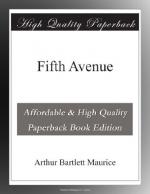He devoted an entire day in railway travel in order to procure a dress-suit, as he called it, in which to appear at a dinner to two English lords. He began to arrange for cotillon dinners, figuring the cost, checking off the invitations, standing at the door of the salon, naming to each man the lady he was to take in.
There was one point to which his subserviency to British visitors would not go. Gastronomically he was as sturdy a patriot as any farmer who blazed away at the Red Coats from behind the Lexington hedges. Stoutly he defended the “saddle” of venison instead of the “haunch.” Our tenderloin steak was quite as good as the English rump. Of Madeira he once said, with the spirit of Nathan Hale, “You have none to liken unto ours.”
That Prince of Wales who afterwards became George the Fourth, in the vigour of his youth, and the prime force of his invention, invented a shoe-buckle. The crowning work in the life of Ward McAllister was probably the institution of the F.C.D.C.’s, abbreviation for the Family Circle Dancing Class. The Patriarch Balls, of which the first were given in the winters of 1872 and 1873, were growing too large and were being monopolized by the married women. The new association was for the jeune fille, and was to be more limited and intimate. Its dances were held at Dodworth’s, later Delmonico’s, and in the foyer of the Metropolitan Opera House. The arbiter paid the price of his greatness. “From the giving of the first to the time of my giving them up, I had no peace either at home or abroad. I was assailed on all sides, became in a sense a diplomat, committed myself to nothing, promised much and performed as little as possible....
“My mornings were given up to being interviewed of and about them; mothers would call at my house, entirely unknown to me, the sole words of introduction being, ‘Kind sir, I have a daughter.’ These words were cabalistic; I would spring up, bow to the ground, and reply: ’My dear Madam, say no more, you have my sympathy; we are in accord; no introduction is necessary; you have a daughter and want her to go to the F.C.D.C.’s. I will do all in my power to do this for you; but my dear lady, please understand, that in all matters concerning these little dances I must consult the powers that be. I am their humble servant; I must take orders from them.’ All of which was a figure of speech on my part.” The arbiter would then diplomatically suggest the possibility of a friend of social influence, and make some allusion to family. That always started the fair visitor. The family always went back to King John and, in some instances, to William the Conqueror. “’My dear Madam,’ I would reply, ’does it not satisfy any one to come into existence with the birth of one’s country? In my opinion, four generations of gentlemen make as good and true a gentleman as forty. I know my English brethren will not agree with me in this, but, in spite of them, it is my belief.’ With disdain, my visitor would reply: ’You are easily satisfied, sir.’ And so on, from day to day, these interviews would go on; all were Huguenots, Pilgrims, or Puritans. I would sometimes call one a Pilgrim instead of a Puritan, and by this would uncork the vials of wrath.”




